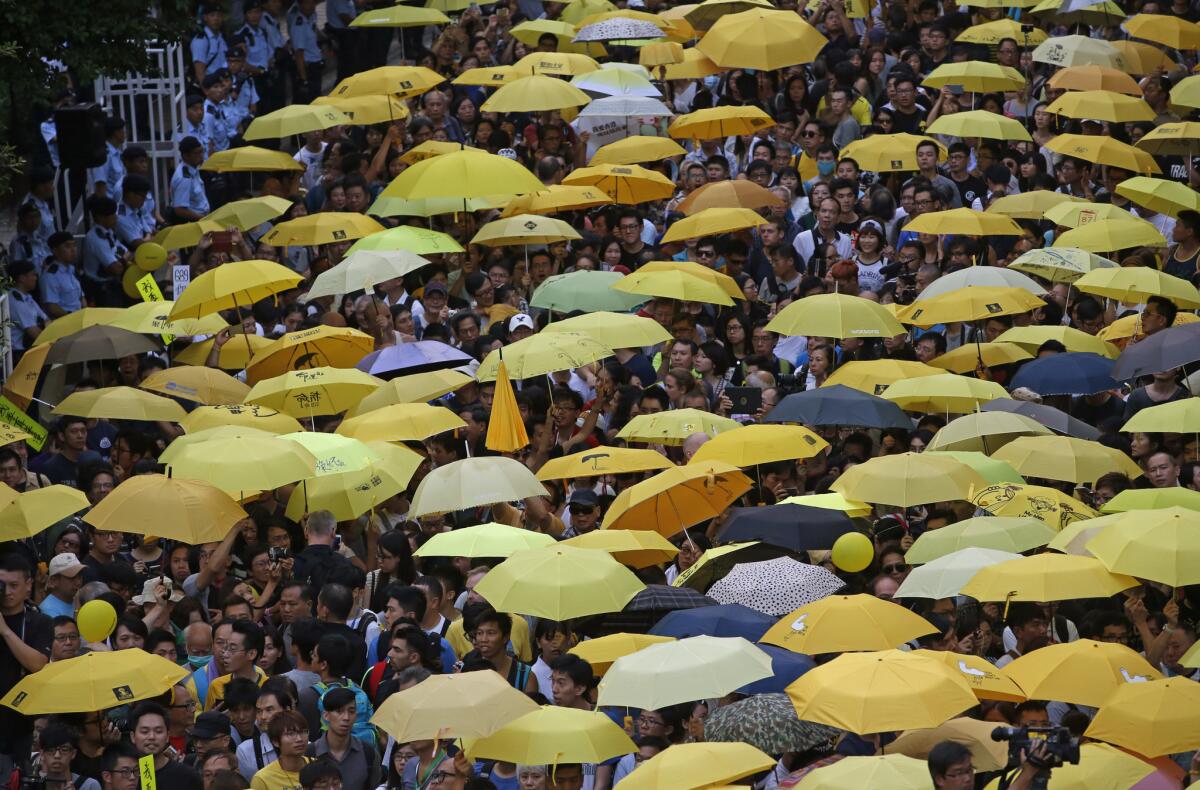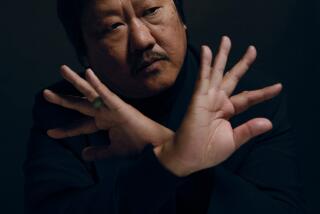Fighting an ‘abyss of helplessness’ -- life after Hong Kong’s ‘Umbrella Movement’

Protesters holding yellow umbrellas gather to observe a moment of silence Monday outside the government headquarters in Hong Kong to mark the first anniversary of the “Umbrella Movement.”
- Share via
Reporting from Hong Kong — It’s been a year since Hong Kong teenager Joshua Wong, along with scores of other pro-democracy protesters, stormed a plaza in front of government headquarters here. A dozen muscular police officers pinned down his spindly frame and hauled him off for two days of detention.
The rest quickly became history: Crowds flooded the streets; tear gas was fired. Wong, upon his release, called for supporters to set up tents in the roadways to put pressure on the government.
Almost overnight, he became the iconic young face of what came to be known as the “Umbrella Movement.”
However, after 10 weeks, the movement ended with a whimper.
Much as the protests transfixed the world, they yielded no concessions from the local government in this semi-autonomous Chinese territory, or from Communist Party rulers in Beijing. Many of those who participated fell into a deep despondency; Wong himself called the mass movement “a failure” that has plunged many a participant into “an abyss of helplessness.”
He was in the crowd Monday evening as nearly 10,000 pro-democracy supporters regrouped in central Hong Kong to mark the one-year anniversary, many unfurling yellow umbrellas and chanting: “Hong Kong won’t be the same again. Democracy defies gas bombs.”
The 18-year-old Wong, as well as a few other student leaders, has spent the last year shuttling between courtrooms and classrooms, trying to maintain some semblance of a normal college student life while fighting criminal charges stemming from spearheading the movement.
Yet, Wong has continued to press his cause. These days he’s rarely rousing crowds by yelling into microphones on makeshift stages. Instead, he has taken to penning political treatises in the territory’s leading Chinese daily newspaper. He’s also gone abroad to drum up support – even while acknowledging the fight is likely to last well into his middle age.
“It may take a generation to achieve democracy,” said Wong this summer. “But our generation must accomplish this and not pass the buck to the next.”
Hong Kong, a former British colony, returned to Chinese rule in 1997 under a “one country, two systems” framework that granted the territory “a high degree of autonomy” for 50 years. Under a mini-Constitution, locals were also promised a wide range of civil liberties unknown in Communist-run mainland China. A one-person, one-vote “universal suffrage” system for electing Hong Kong’s chief executive was included as a goal.
But in 2047, Hong Kong is expected to fully integrate with the rest of China. That sunset clause has Wong worried, and he’s casting his gaze 30 years down the road.
“Truth be told,” Wong wrote in an op-ed two weeks ago in Ming Pao, a local Chinese-language newspaper, “relying on ‘one country, two systems’ to preserve our values is a lost cause.”
The college sophomore has hit the international speaking circuit, giving his maiden overseas talk at UCLA and being honored at a black-tie gala in Washington last week for his role in fighting for democracy.
All along, he has worn his fame (and notoriety) more comfortably than the seemingly overstarched shirt he donned for the Freedom House fete in the U.S. capital.
He confessed on his Facebook page that he is much more at ease dressed in what has become his protest uniform: A black T-shirt emblazoned with the logo of Scholarism, the high school activist group he founded four years ago, alongside a rallying cry printed in highway-barrel orange: “Reclaim our gov.”
His catapult to global prominence notwithstanding, Wong has remained very much the boy next door. He strolls to the movies with his girlfriend, rides the subway, and was flummoxed as to what color his first tie should be. His heightened self-consciousness as a public figure only occasionally shows, as he sometimes refers to himself in the third person.
Last fall, Wong and his fellow Umbrella Movement protesters were campaigning for what they called “free and fair elections” for the city’s chief executive.
The demonstrators were angered by an election framework set forth by Communist leaders in Beijing that would have, for the first time, given Hong Kong voters the right to directly elect their chief executive– but required candidates to be endorsed by a panel of Beijing loyalists. Critics said that only provided the illusion of free choice.
This summer, the protesters won a Pyrrhic victory of sorts. Hong Kong lawmakers refused to endorse Beijing’s election framework. That means Hong Kong will maintain the current system of choosing its chief executive: The leader will be selected by a panel of 1,200 members, most of whom are regarded as “pro-Beijing” delegates.
Now, Scholarism’s leaders say they are seeking a way off what they regard as the hamster wheel that has been Hong Kong’s 30-year struggle for democracy.
Instead of beseeching or battling Beijing for direct “free and fair” elections for chief executive, they want Hong Kongers to take a different tack. Wong and his fellow Scholarism members have been advocating the idea of amending the local constitution to allow for referendums on controversial issues.
“I only hope Hong Kongers recognize Beijing’s election framework doesn’t provide a way out,” said Wong. “So we need to start now to build our own path to a future.”
“If Hong Kong could exercise democratic self-governance under the sovereignty of China, it would not be necessary for us to take this step on the path toward independence,” he added in a recent commentary for Time.
But as things stand now under the current one country, two systems framework, he maintains, the struggle for a free vote is “futile” and the dream of maintaining Hong Kong’s “core values” -- including freedom of speech and press -- after 2047 is “simply nonsensical.”
“We should have a say on our city’s future,” said Agnes Chow, 18, a founding member of Scholarism and close comrade of Wong’s. “What we want is a more direct form of democracy.”
Wong and his fellow Scholarism members believe that if the territory’s mini-constitution could be amended to allow for such referendums, they could call for a Hong Kong-wide vote on the territory’s self-determination in a decade or so.
A mechanism does exist to amend the mini-constitution through Hong Kong’s legislature, but any change must be consistent with Beijing’s policies regarding Hong Kong – a big “but.”
Still, in theory, such a referendum would allow Hong Kongers to express their views on how they would want to carry on under Communist Chinese rule before the 50-year framework expires.
Wong and his fellow activists say they know they need to find ways to gain traction for their arguments among Hong Kong’s 7.3 million citizens.
To that end, Wong says he is prepared to go where few trod before. Quoting Lu Xun, modern China’s best known reformist writer, he said: “In the beginning, there was no sign of any path. With more trailblazers, then the way forward becomes clear.”
Law is a special correspondent. Staff writer Julie Makinen in Beijing contributed to this report.
Follow @JulieMakLAT for news from China
More to Read
Sign up for Essential California
The most important California stories and recommendations in your inbox every morning.
You may occasionally receive promotional content from the Los Angeles Times.










